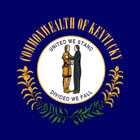(Frankfort, KY, USA – January 12, 2022) - A representative in the Bluegrass State wants to make Kentucky the 43rd state in the union to restore sound money.
Building on the success that more than half a dozen pro-sound money measures have enjoyed in their respective states since 2018, House Bill 272, introduced by Rep. Kirk-McCormick (93 - R), aims to remove Kentucky sales taxes on gold, silver, platinum, and palladium coins and bars.
Kentucky’s discriminatory taxation is directed at small-time savers and investors – and has made the Bluegrass State one of the very worst states in the nation on the sound money issue, including almost every neighboring state.
The current policy is harmful to Kentucky businesses while also being counterproductive in raising net tax revenues for the state.
Kentucky lawmakers should immediately reverse this policy by passing HB 272. Here are a few reasons why taxing monetary metals is wrong:
- Kentucky does not tax the purchase of any other investment. Kentucky does not tax the purchase of stocks, bonds, ETFs, currencies, and other financial instruments. Gold and silver are held as forms of savings and investment. Taxing precious metals is a de-facto investment penalty on certain savers and investors.
- Studies have shown that taxing precious metals is an inefficient form of revenue collection. The results of one study involving Michigan show that any precious metals tax proceeds Kentucky gains are likely surpassed by the state revenue lost from conventions, businesses, and economic activity that are driven out of the state.
The harm is exacerbated when you consider that all of Kentucky’s neighbors, including Illinois, Indiana, Missouri, Ohio, Virginia, and West Virginia have already stopped taxing gold and silver.
- Taxing precious metals is harmful to citizens attempting to protect their assets. Purchasers of precious metals aren't fatcat investors. Most who buy precious metals do so in small increments as a way of saving money. Precious metals investors are purchasing precious metals as a way to preserve their wealth against the damages of inflation. Inflation harms the poorest among us, including pensioners, Kentuckians on fixed incomes, wage earners, savers, and more.
In 2019, the state of Ohio experimented briefly with slapping taxes on precious metals purchases. They quickly reversed course only one year later -- and reinstated the exemption on precious metals -- because businesses, coin conventions, and state tax revenues were leaving the state.
Meanwhile, 42 states have removed some or all taxes from the purchase of gold and silver. Kentucky currently stands against the vast majority of its peers and its neighbors.
The Sound Money Defense League and Money Metals Exchange strongly support and are actively working with lawmakers in Kentucky to ensure the passage of this important measure. Tennessee, Mississippi, Hawaii, and Alabama are just a few of the other states fighting their own sound money battles in 2022.

About the Author:
Jp Cortez is a graduate of Auburn University and a resident of Charlotte, North Carolina. He is the Executive Director of the Sound Money Defense League, an organization working to remonetize gold and silver through nationwide legislative efforts. Follow him on X (Twitter) @JpCortez27.





